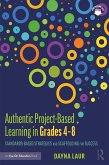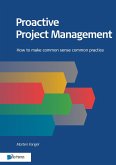Teacher relationships with students are built through awareness of how to achieve and maintain academic success, positive school relationships, and community awareness. Other areas of significance are students developing skills to lead the school in meetings, panel discussions, seminars, speech contests, and positive school rallies that will reflect students' input. Positive student relationships provide alternative solutions to problems that students encounter at school and in the community.
Dieser Download kann aus rechtlichen Gründen nur mit Rechnungsadresse in A, D ausgeliefert werden.









